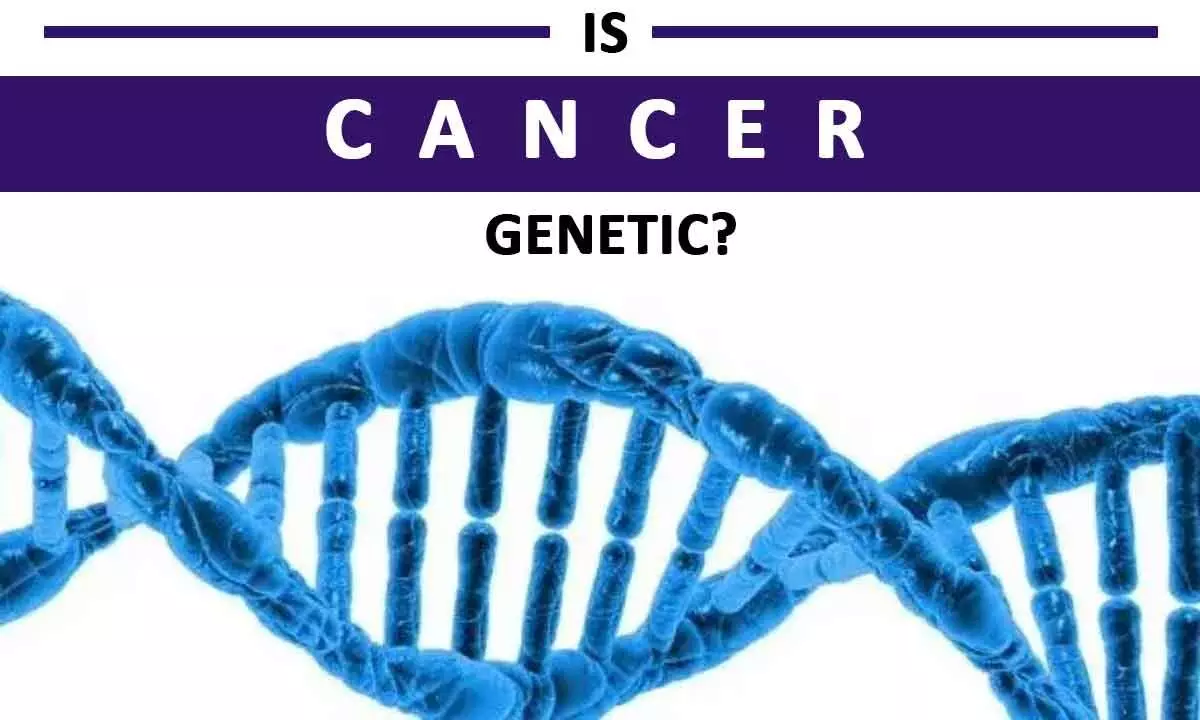Know which cancer is Genetic: symptoms of Genetic Cancer

Cancer is caused by abnormal mutation of genes and these changes tend to occur intermittently in one or fewer cells.
The number of new cancer cases is expected to rise to 22 million in the next two decades. There are lot of researchers across the fact of family history of cancer. Researchers stated that, few of the cancers are directly linked to defective (mutant) genes. Nearing to 14 of the defective genes have already been identified by the researchers those are mutating and directly responsible for causing genetic cancers. These genes are inherited from the person's parents. It is believed that more or less 5 to 10% cancer are genetic or hereditary.
The number of new cancer cases is expected to rise to 22 million in the next two decades. There are lot of researchers across the fact of family history of cancer. Researchers stated that, few of the cancers are directly linked to defective (mutant) genes. Nearing to 14 of the defective genes have already been identified by the researchers those are mutating and directly responsible for causing genetic cancers. These genes are inherited from the person's parents. It is believed that more or less 5 to 10% cancer are genetic or hereditary.
If there exists a prolonged family history of any specific type of cancer reoccurring through generations. It can called genetic cancers and it could be inherited, by further generations. Hence, the family history of cancer is significant and it might be often be related. But Cancer is not directly inherited but the defective genes tend to make it more likely for those particular cancers to occur.
On the other hand, cancers which are not due to inherited gene/s but malignant changes (mutation) occur is called sporadic cancer. Therefore, it could be concluded, all cancers are caused by genetic mutations, but all genetic mutations are inherited.
Which cancer are genetic?
People commonly tend to wonder which cancers are genetic. As of now, few of the cancers are better identified as genetic cancer, although these cancers can occur sporadically too. This needs to take into consideration, the family history of cancer and perform necessary tests. It is significant to perform special tests in family members, to infer they have the gene of interest or not.
Here are a few instances of cancers commonly found as genetic cancer
• Bone Cancer (osteosarcoma)
• Soft-tissue Sarcoma
• Acute Leukemia
• Breast Cancer
• Brain Cancer
• Prostate Cancer
• Adrenal cortical tumors (kidney Cancer)
What is genetic cancer?
Cancer is caused by abnormal mutation of genes and these changes tend to occur intermittently in one or fewer cells. This is one of the major reason as to why the family history of cancer has always been significant in evaluating a case. It is the natural consequences of that cell's getting damaged on varied grounds. These changes in genes are acquired or somatic.
But when an abnormal DNA is passed from the Parent(s) to their offspring/s it is called genetic. This abnormal, mutated or damaged DNA's present in the egg or sperm. After fertilization of the egg, the single cell zygote forms. That zygote starts to divide itself to form the fetus. Since all the cells in the bady (fetus) come from that Zygote the abnormal, mutated or damaged DNA/s is/are carried over on to the next generation and so on.
It is highlighted here that, people who are carrier over with such mutated bad genes do not essentially suffer from cancer, but their exist risk of developing the disease at some point during their lifetime is higher than average.
Symptoms of Genetic Cancer
Cancer in parent(s), close relatives at each side of the family separately or sibling, must be more cause for concern to detect as to whether it is genetic or acquired. Few things must be existing in family history, that could be concluded as family cancer syndrome after due genetic test, such as
- Numerous cases of an uncommon or rare type of cancer (such as kidney cancer)
- Cancer occurring at younger ages than usual (such as colon cancer, whose age is around 20 years)
- More than one type of cancer in a single individual (such as women with both breast as well as ovarian cancer)
- More than one childhood cancer in a set of siblings (Such as sarcoma in both a brother and a sister)














